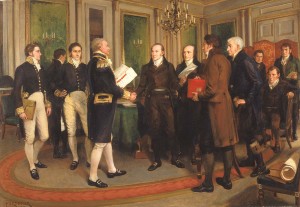
The War of 1812 is sometimes refered to as “Mr. Madison’s War” due to the fact that the administration of James Madison was the primary place of pro-war sentiment. However, if one man could be credited with the start of the War of 1812, I believe it would be Henry “patriotic-to-a-fault” Clay. Clay, Speaker of the US House in 1812, was a vital agent in the American declaration of war against Great Britain. In fact, his leadership of the War Hawk faction in Congress positioned him as the foremost pro-war leader in the American government, even more so than Madison or Secretary of State Monroe.
Clay’s background as a statesman from the West (Kentucky) gave him a natural regard for the interests of Western frontiersmen. Despite a variety of issues that lead to America’s second war with Great Britain, issues affecting a vast variety of Americans from a variety of regions, the war merited greater recognition in the West than it did in the South or New England. Clay was the face of the West and his regional biases were fundamental to his radical pro-war stance.
Clay, while he was Speaker, had a knack for legislative tyranny and showy orations. He ruled the House dictatorally, shutting down his opponents in debates and setting a precedent of using the Speakership as a position of power rather than a simple parliamentary office. Not content to watch the debates however, he would take time to relinquish the Speaker’s chair and take his own place on the floor to add his own opinions on a certain matter. In many of these instances, the subject in question was war with Great Britain.
Clay saw all the issues facing the United States leading to the war: impressment, trade disputes and British military presence in the Great Lakes, as an affront and insult to American honor. Fiercely patriotic, Clay could not overlook these offensive actions and believed that an international duel of sorts was necessary to protect American honor.
As zealous as he was in warmaking, Clay retained his zeal in peacemaking. He was sent to the peace negotiations in Ghent, Belgium in 1814. Despite ridiculous British demands, a favorable treaty was secured for the United States, considering the circumstances. This was, in large part, thanks to the stubborn persistence of Clay who was willing to fight over every audacious British demand. He crusade against the British navigation of the Mississippi River was natural for a Westerner and he was lauded as a hero at home in Kentucky.
Clay was a central character in the War of 1812. He played a pivotal role in the declaration of war and in the peace treaty. He constantly pursued the honor and dignity of the United States and preeminence of the West.
